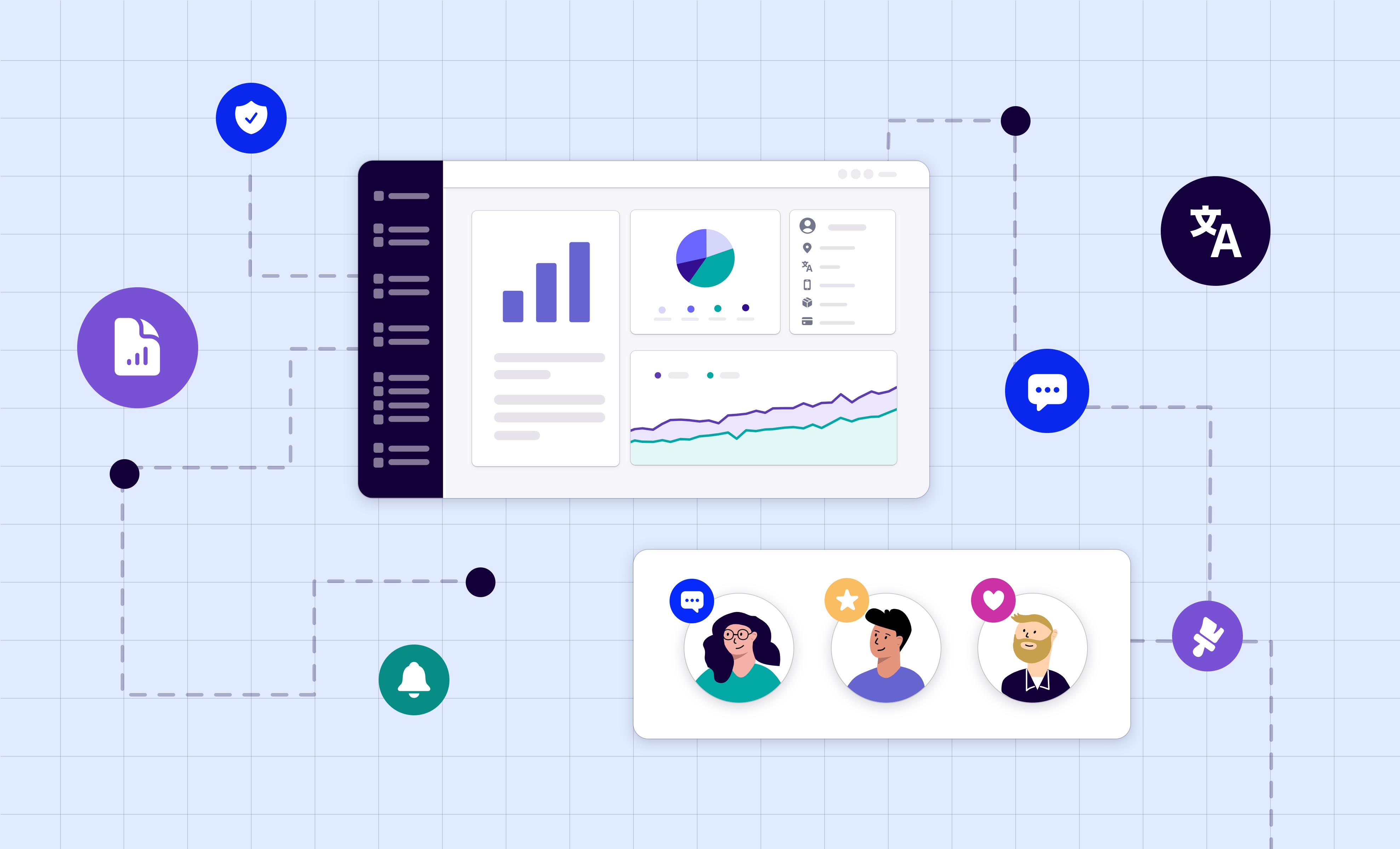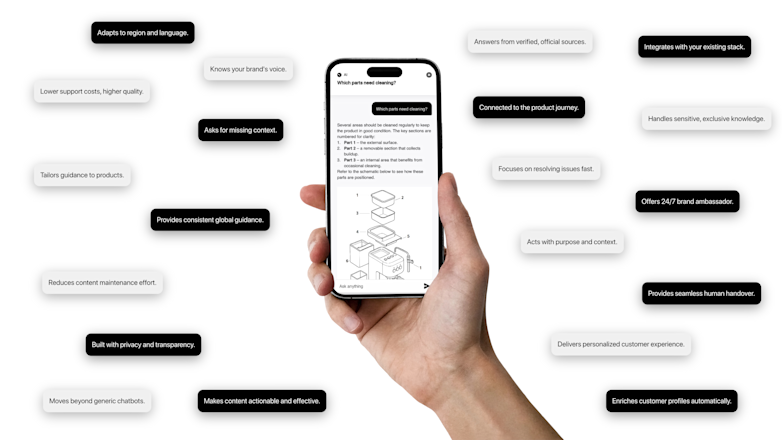
AI has been a crowd-favorite buzzword for a good 20 years now. However, its real-life incorporation in businesses is more recent. Predictive analytics, machine learning algorithms, and personalized marketing campaigns are some ways AI is helping companies reach corporate goals.
AI integration isn’t the only innovation today’s brands are working on. Each company comprises multiple moving parts, and how these elements work together ultimately translates to any brand's success. With the increasing demand for exceptional brand experiences? Let’s see what AI is and how organizations can use it in customer-brand relationships.
What is artificial intelligence?
AI or Artificial intelligence is the technology that mimics human intelligence. These are software, processing systems, and tools capable of learning on the go and adapting their comprehension and problem-solving skills. The fluid nature of these programs sets them apart from other computing systems.
For many of us, the concept of Artificial Intelligence is heavily influenced by pop culture. Understandably, it’s difficult to see how AI applies to the customer-facing side of the business. Conventional logic expects AI-driven interactions to sound cold and straightforward. That makes them unsuited for complaints resolution and customer service, right? In reality, modern AI systems can replace up to 85% of customer communications in the upcoming years.
How artificial intelligence applies to customer relationship management
AI is modifying how companies handle customer relationships and helping deliver enhanced, more meaningful interactions between brands and consumers. AI-driven technology is changing traditional business practices, be it products or services.
Here are some ways AI revolutionizes customer-brand relationships in all areas:
Delivering what’s needed: Better product research and development fueled by customer needs and preferences.
Identifying industry vacuums: Filling in market gaps by prioritizing product and service features valued by consumers
Servicing better: Creating increasingly accurate customer behavior and purchasing pattern predictions.
Controlling Spam: Helping brands cut down on cold calls and cold emails despised by customers. AI is helping brands laser-focus marketing efforts toward potential customers most likely to benefit from specific products or services.
Helping increase customer retention: Improving after-sales processes by better data management and quick complaint resolution.
Six benefits of using artificial intelligence
AI has the potential to improve customer experience across the board by making interactions more efficient. Using AI to analyze customer data and automate certain tasks, brands can create wholesome and satisfying customer experiences.
AI in customer relations can improve efficiency, personalization, availability, and cost savings. It can also provide valuable insights for businesses by helping them develop more accurate and updated customer service strategies.
Here are some benefits of integrating AI into customer service practices, such as personalized recommendations, tailored marketing messages, and better data processing:
1. Predict and intercept potential issues
Preventing issues from occurring is one way AI is helping companies improve consumer relationships with their brands. AI is very good at processing and analyzing large amounts of data gathered through customer interactions.
These statistics can help brands nip multiple customer complaints and product defects in the bud. That’s how AI helps organizations improve their offerings while enhancing customer interactions.
2. Serve customers through multiple communication avenues
Most companies have hotlines to facilitate customer complaint registration and resolution processes. Thanks to the influx of e-commerce, brands available to their customer base across various frontiers stand out among the competition. AI streamlines the process of making brands more available to consumers when and where they need assistance.
Moreover, AI-powered chatbots and virtual assistants can process multiple languages. That makes it easier for businesses to expand globally and serve customers regardless of where they are. AI-powered technology never takes days off. That gives another leg up to businesses that rely on it instead of customer service representatives.
3. Reducing complaint resolution time
Cutting customer service response time is a key metric all brands looking to improve customer relations strive for. AI-powered technological solutions make your customer service representatives more effective at their jobs. Most complaints are dealt with through automated chatbots and NLP-backed software programs.
Even for brands that use a combination of employees and AI, complaint resolution time is drastically cut-down thanks to better data management, KPI tracking, and insight related to customer issues.
4. Increasing the range and availability of personalized customer services
AI spearheads changes in brand-consumer relationships by increasing the range of what is considered great customer service. AI is making personalized omnichannel communication with consumers possible, and that too with reduced response time.
AI-backed software can analyze customer data and interactions to provide personalized recommendations within seconds. That lets brands tailor-design the assistance they extend to each patron.
For example, a chatbot might suggest products or services based on a customer's previous purchases from their brand. Taking into account their preference, demographics and browsing, and social media history.
5. Efficient customer service scalability
AI-powered technology is how organizations can extend one-on-one support to more customers than ever, regardless of time or geographical limitations.
AI is capable of handling large volumes of customer inquiries simultaneously. With a smaller customer service team overlooking operations and stepping in when needed. That leads to faster resolution times and increased customer satisfaction.
6. Superior data management
Data generated through every process of the e-commerce sales funnel is no less than a gold mine for brands. Collecting, analyzing, processing, and storing this data is a tremendous task. Now, through AI-powered tools, organizations can harvest relevant information from the massive amounts of data generated daily.
Data-driven statistics are how brands deliver personalized and more efficient customer experiences, leading to increased customer satisfaction and loyalty.
Challenges in adopting artificial intelligence
Consumers are giving experiences and brand relationships more value; that’s why 84% of companies want to improve customer relations. For most brands looking to stay relevant in today’s evolving business climate, AI is unmistakably the silver bullet that leverages multiple benefits in their favor.
Although no longer in its infancy, AI technology is still new, especially AI integration in customer-facing roles. Some challenges brands face in adopting AI-based technologies:
1. Data privacy challenges
Earning and maintaining consumer trust is no small feat for any brand. Today, consumers that give your product or service a go also trust you with their information. With the role of AI-powered software in consumer-centric positions increasing, keeping consumer data privacy can be a real challenge for brands.
There are multiple legal and ethical considerations to take into account when using AI in customer relations. Organizations must ensure compliance with data privacy laws and regulations, such as the General Data Protection Regulation (GDPR) in the European Union.
2. Unpredictable behaviors
AI differs from other processing programs because it constantly adapts and evolves. Consumer behavior, too, is not an exact science and has many moving parts. Most AI-backed decision-making is based on past consumer behaviors and industry trends. Unexpected changes in any of these factors can throw off calculations and lead to mistakes that cost brands resources and time.
Then there’s the challenge of explaining the AI system’s behaviors to consumers. AI systems can be difficult to understand and interpret. That makes it difficult for customers to know why they received a particular outcome. This lack of transparency can lead to frustration and mistrust among customers.
3. Insufficient IT infrastructure
Another major challenge organizations face is the lack of basic IT infrastructure to adapt AI-based technologies. That includes the lack of skilled talent to manage and adapt these programs to the company's requirements.
4. Integration of AI with existing technologies
Companies invest heavily in software and systems to improve customer-relation processes. Incorporating AI-based technologies within the existing systems can seem like a complete overhaul of current methods and the development of new strategies.
For most brands, incorporating AI in sustainable and effective ways should look more like a marathon than a sprint, which is a challenge.
5. Initial investment
AI technologies have yet to become mainstream in customer-facing roles. Even though most AI-based technologies promise amazing ROI and improved customer retention rates, it’s a considerable strain on resources.
Another challenge is that AI in consumer relations is relatively new and has yet to prove real-life profitability for businesses. That discourages most brands from making the switch. One of the challenges organizations face in adopting AI-based programs is the hefty initial investment.
6. Managing expectations
More than 60% of consumers are open to AI integration in customer services. But that enthusiasm can often work against companies as well. Most consumers have unrealistically high expectations of AI-driven customer service experiences.
Managing these customer expectations is challenging for most brands, especially since these technologies are still relatively new.
Conclusion
In conclusion, AI has the potential to revolutionize customer-brand relationships. Its incorporation in businesses has been increasing, and it helps companies achieve corporate goals through predictive analytics, machine learning algorithms, and personalized marketing campaigns. AI can improve customer experience by making interactions more efficient, personal, and available, while reducing complaint resolution time and increasing the range of personalized customer services. AI is also capable of handling large volumes of customer inquiries and provides superior data management for businesses. These benefits make AI an essential tool for companies looking to improve customer relations and stay ahead of the competition.
Learn how to collect valuable insights on your customers to sell even more.

How to Turn a New Obligation into a Growth with Layerise

A trusted, brand-safe AI assistant that knows your products, your customers and your content.



